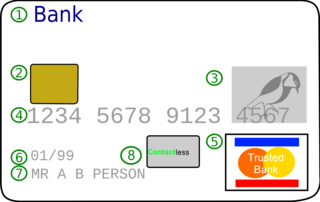Related Research Articles

A debit card, also known as a check card or bank card, is a payment card that can be used in place of cash to make purchases. The card usually consists of the bank's name, a card number, the cardholder's name, and an expiration date, on either the front or the back. Many of the new cards now have a chip on them, which allows people to use their card by touch (contactless), or by inserting the card and keying in a PIN as with swiping the magnetic stripe. These are similar to a credit card, but unlike a credit card, the money for the purchase must be in the cardholder's bank account at the time of the purchase and is immediately transferred directly from that account to the merchant's account to pay for the purchase.

A mobile payment, also referred to as mobile money, mobile money transfer and mobile wallet, is any of various payment processing services operated under financial regulations and performed from or via a mobile device, as the cardinal class of digital wallet. Instead of paying with cash, cheque, or credit cards, a consumer can use a payment app on a mobile device to pay for a wide range of services and digital or hard goods. Although the concept of using non-coin-based currency systems has a long history, it is only in the 21st century that the technology to support such systems has become widely available.

iMesh was a media and file sharing client that was available in nine languages. It used a proprietary, centralized, P2P network (IM2Net) operating on ports 80, 443 and 1863. iMesh was owned by American company iMesh, Inc., who maintained development centers around the world. As of 2009, it was the third most popular music subscription service in the US.
AllOfMP3, MP3Sparks and MemphisMembers are brands of online music store that were operated by Mediaservices, Inc., a company founded in 2000 in Moscow, Russia. The stores formerly sold music encoded in standard, non-protected audio formats at a significantly lower cost than other online music stores. In 2008, the original AllOfMp3 site was replaced by a blog.

eMusic is an online music and audiobook store that operates by subscription. In exchange for a monthly subscription eMusic users can download a fixed number of MP3 tracks per month. eMusic was established in 1998, is headquartered in New York City with an office in London, and is owned by TriPlay.

A prepaid mobile device, also known as a pay-as-you-go (PAYG), pay-as-you-talk, pay and go, go-phone, prepay or burner phone, is a mobile device such as a phone for which credit is purchased in advance of service use. The purchased credit is used to pay for telecommunications services at the point the service is accessed or consumed. If there is no credit, then access is denied by the cellular network or Intelligent Network. Users can top up their credit at any time using a variety of payment mechanisms.
An e-commerce payment system facilitates the acceptance of electronic payment for offline transfer, also known as a subcomponent of electronic data interchange (EDI), e-commerce payment systems have become increasingly popular due to the widespread use of the internet-based shopping and banking.
A chargeback is a return of money to a payer of a transaction, especially a credit card transaction. Most commonly the payer is a consumer. The chargeback reverses a money transfer from the consumer's bank account, line of credit, or credit card. The chargeback is ordered by the bank that issued the consumer's payment card. In the distribution industry, a chargeback occurs when the supplier sells a product at a higher price to the distributor than the price they have set with the end user. The distributor submits a chargeback to the supplier so they can recover the money lost in the transaction.

An overdraft occurs when something is withdrawn in excess of what is in a current account. For financial systems, this can be funds in a bank account. In these situations the account is said to be "overdrawn". In the economic system, if there is a prior agreement with the account provider for an overdraft, and the amount overdrawn is within the authorized overdraft limit, then interest is normally charged at the agreed rate. If the negative balance exceeds the agreed terms, then additional fees may be charged and higher interest rates may apply.
A merchant account is a type of bank account that allows businesses to accept payments in multiple ways, typically debit or credit cards. A merchant account is established under an agreement between an acceptor and a merchant acquiring bank for the settlement of payment card transactions. In some cases a payment processor, independent sales organization (ISO), or member service provider (MSP) is also a party to the merchant agreement. Whether a merchant enters into a merchant agreement directly with an acquiring bank or through an aggregator, the agreement contractually binds the merchant to obey the operating regulations established by the card associations. A high-risk merchant account is a business account or merchant account that allows the business to accept online payments though they are considered to be of high-risk nature by the banks and credit card processors. The industries that possess this account are adult industry, travel, Forex trading business, multilevel marketing business. "High-Risk" is the term that is used by the acquiring banks to signify industries or merchants that are involved with the higher financial risk.

Network for Electronic Transfers, colloquially known as NETS, is a Singaporean electronic payment service provider. Founded in 1986, by a consortium of local banks, it aims to establish the debit network and drive the adoption of electronic payments in Singapore. It is owned by DBS Bank, OCBC Bank and United Overseas Bank (UOB).

Google Pay Send, previously known as Google Wallet, was a peer-to-peer payments service developed by Google before its merger into Google Pay. It allowed people to send and receive money from a mobile device or desktop computer.

The Severn TAG was a payment system for collecting bridge tolls for drivers using either the Severn Bridge Crossing or the Second Severn Crossing over the Severn Estuary between England and Wales.
Lala was an online music store created by Silicon Valley entrepreneur Bill Nguyen. The service allowed members to legally create online shareable "playlists" of their own uploaded music which could play full length songs for other registered Lala members, purchase MP3s, stream music on a one-time basis or as inexpensively purchased "web songs," buy new CDs from the Lala store, leave blurbs on other members' pages, and participate in the community forums. Lala contracted with major labels and offered a large catalog of albums to stream or purchase. Their home page claimed over 8 million licensed songs available.

The Green Dot Corporation is an American financial technology and bank holding company headquartered in Austin, Texas. It is the world's largest prepaid debit card company by market capitalization. Green Dot is also a payments platform company and is the technology platform used by Apple Cash, Uber, and Intuit. The company was founded in 1999 by Steve Streit as a prepaid debit card for teenagers to shop online. In 2001, the company pivoted to serving the "unbanked" and "underbanked" communities. In 2010, Green Dot Corporation went public with a valuation of $2 billion. Since its inception, Green Dot has acquired a number of companies in the mobile, financial, and tax industries including Loopt, AccountNow, AchieveCard, UniRush Financial Services, and Santa Barbara Tax Products Group.
An issuing bank is a bank that offers card association branded payment cards directly to consumers, such as credit cards, debit cards, contactless devices such as key fobs as well as prepaid cards. The name is derived from the practice of issuing cards to a consumer.

A credit card is a payment card issued to users (cardholders) to enable the cardholder to pay a merchant for goods and services based on the cardholder's accrued debt. The card issuer creates a revolving account and grants a line of credit to the cardholder, from which the cardholder can borrow money for payment to a merchant or as a cash advance. There are two credit card groups: consumer credit cards and business credit cards. Most cards are plastic, but some are metal cards, and a few gemstone-encrusted metal cards.
A decoupled debit card is a debit card in the US that is not issued by, and not tied to, any particular retail financial institution, such as a bank or credit union. This is based on the ability in the US ACH Network payment system to make an electronic payment from any bank or credit union without needing to use a card issued by the bank or credit union. A third party, such as a retailer, can create a decoupled debit card which will use this system to make a payment from the customer's checking account. They may do this as part of a loyalty scheme or to reduce their own debit card processing costs.
Venmo is an American mobile payment service founded in 2009 and owned by PayPal since 2013. Venmo was aimed at friends and family who wish to split bills, e.g., for movies, dinner, rent, or event tickets etc. Account holders can transfer funds to others via a mobile phone app; both the sender and receiver must live in the United States. On Venmo, a little social network, users can observe how others who are sending money to one another interact with amusing emoticons. In 2021, the company handled $230 billion in transactions and generated $850 million in revenue.

Google Pay is a mobile payment service developed by Google to power in-app, online, and in-person contactless purchases on mobile devices, enabling users to make payments with Android phones, tablets, or watches. Users can authenticate via a PIN, passcode, or biometrics such as 3D face scanning or fingerprint recognition.
References
- ↑ Terms of Use Archived 2011-12-22 at the Wayback Machine , Section 4.3
- ↑ "ISPs in South Africa refuse to block access to low-cost music sites". afterdawn.com. August 13, 2009. Retrieved May 5, 2015.
- ↑ Rindlesbach, Morgan. "Fifteen cents a song -- is it too good to be true?", Hard News Cafe Utah State University, December 15, 2006